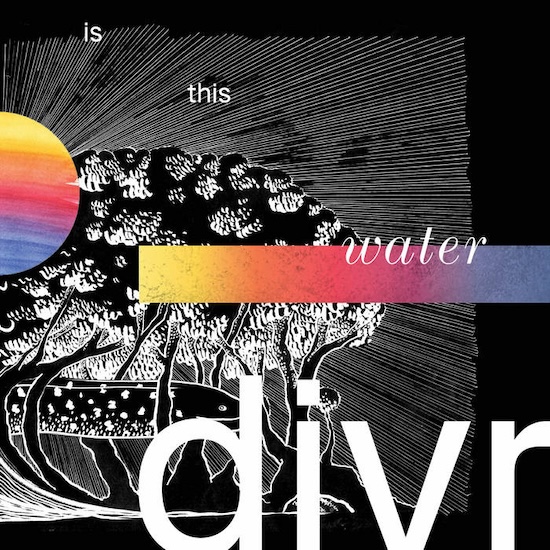A tranquil string of piano chords stumbles along, the notes floating and coalescing like bubbles in water. There’s a lethargic quality to the bass pulses and sparse percussive tingles, ticks, and bops that follow in their trail, hugging closely the reverberation of each key. The opening movements of Swiss trio divr’s debut Is This Water inhabit a dreamy setting, awash in soft white light and a soothing fog. Pianist Philipp Eden, double bassist Raphael Walser, and drummer Jonas Ruther soon lock into a tight groove, looping over a subtle collective articulation, only for a rain cloud to obscure the light and threaten the mood. The piano stutters and scatters its notes. Without a lead to follow, drum hits and bass lines begin to skitter around, searching in panic for an anchor. Briefly, the trio find themselves engaged in serrated, grave improvisation.
Although this minimalist, simultaneously disciplined and loose approach invites comparisons with the equally quixotic zen funk of their compatriot Nik Bärtsch or the ever shifting progressions of The Necks, divr’s music resists trite categorisation. The trio seem to draw from numerous influences, but the most intriguing threads of their style lead to the indie electronic and post-rock aesthetics from the turn of the millennium. The result is a sound that manifests as a nuanced distillation of the jazzy undercurrents found in the works of Four Tet, Tortoise, or Caribou while eschewing the pitfalls of anaemic lounge jazz arrangements of electronic and rock songs.
Instead, each of the nine tracks on Is This Water contains a radiant turn of phrase that makes it unique, from the inspired dark jazz deconstruction of Gus Arnheim, Charles N. Daniels, and Harry Tobias’s standard ‘Sweet And Lovely’ on ‘Supreme Sweetness’ to the careful reframing of Broadcast’s lovely ‘Echo’s Answer’ and Radiohead’s ‘All I Need’, which they make their own. These renditions retain enough elements from the originals to remain recognisable, yet listening to them never actually feels like listening to covers.
If these borrowed pieces underline Eden, Walser, and Ruther’s musical romanticism and interpretational acumen, their own spontaneous compositions show the full potential of a keen group working directly with improvisation and indirectly through (post-)production touches (courtesy of Dan Nicholls). On ‘Upeksha’, a lush string texture intensifies the group’s flickering interplay, as breathless piano licks clash with insistent cymbal hits and the weighty thwacks of plucked double bass. ‘VHS Tomorrow’ wraps birdsong, oblique ambient, and decidedly cinematic expressions in an analogue, lo-fi patina, providing a detached lede to ‘A Glass Is No Glass Is a Glass’ that later expands this strange sonic landscape with scraping noises and faint atonal slant.
Elsewhere, divr continue their stroll through jazz styles and blends by veering closer to traditional post-bop on ‘Tea High’. Eden’s phrasing becomes lyrical, evoking Bill Evans’s or Michel Petrucciani’s energetic but fluid style. He piles keys upon keys as if building a castle in the sand, while Walser and Ruther’s rhythmic backdrop grows gloomier around him, mimicking a rising tide about to swallow the beach. It makes for a thrilling highlight of a charming jazz album that is both easy to listen to and intricate, yet never, ever garish.


